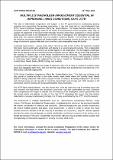May 2012 Basic Needs and Nutrition Basket: Multiple Stakeholder Involvement Essential in Improving Living Conditions, Says JCTR

View/
Date
2012-05-11Author
Jesuit Centre for Theological Reflection
Type
StatementLanguage
enItem Usage Stats
29
views
views
13
downloads
downloads
Abstract
According to the latest BNB for the month of April 2012, the cost of living in Lusaka for a family of five stood at a staggering high of K2, 907,540 with the cost of food and essential non-food items at K776, 840 and K2, 130,700 respectively. JCTR Social Conditions Programme Officer Mr. Sosten Banda says, “This high cost of living is not only typical to Lusaka but also to the other eleven urban towns where the monthly Basic Needs Basket is being conducted. This means a great number of citizens, including employees in the formal and informal sector are still not able to meet the current high cost of living and if this situation is left unchecked, income poverty will remain perpetual for many Zambians.” The JCTR Basic Needs Basket has also shown that, over the years the cost of meeting basic food and essential non-food items has remained consistently high and unaffordable for most Zambians when compared to the wages or salaries that the majority of the employees, both in government and
the private sector are getting. In view of this, the JCTR recognises the crucial role that various stakeholders can play in addressing the high cost of living as reflected by the JCTR monthly baskets.
Description
The idea of stakeholder cooperation and support to the PF government in accelerating poverty
reduction and overcoming the growing inequalities is one that need not be overemphasised says
JCTR, Social Conditions Programme Officer, Mr. Sosten Banda. The Centre therefore welcomes, the
European Union’s undertaking, made at the recent Commemoration of the European Union Day, to
support the objectives of the government through provision of technical assistance to reduce poverty
and also add its voice to the sentiments of the EU head of delegation, that although the country was
doing well, few citizens benefited from the country’s economic growth.